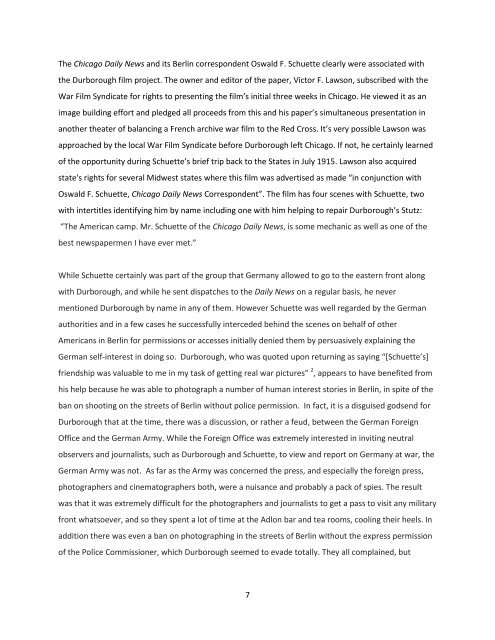"On the Firing Line with the Germans" Film Annotations (2017)
Film annotations, describing the making of Wilbur H. Durborough's World War I feature film "On the Firing Line with the Germans (USA, 1915) by authors Cooper C. Graham, Ron van Dopperen and James W. Castellan (April 2017). For more information visit our weblog http://shootingthegreatwar.blogspot.nl The movie can be watched on our YouTube channel: https://youtu.be/958QR_Cdg5U
Film annotations, describing the making of Wilbur H. Durborough's World War I feature film "On the Firing Line with the Germans (USA, 1915) by authors Cooper C. Graham, Ron van Dopperen and James W. Castellan (April 2017).
For more information visit our weblog http://shootingthegreatwar.blogspot.nl
The movie can be watched on our YouTube channel:
https://youtu.be/958QR_Cdg5U
You also want an ePaper? Increase the reach of your titles
YUMPU automatically turns print PDFs into web optimized ePapers that Google loves.
The Chicago Daily News and its Berlin correspondent Oswald F. Schuette clearly were associated <strong>with</strong><br />
<strong>the</strong> Durborough film project. The owner and editor of <strong>the</strong> paper, Victor F. Lawson, subscribed <strong>with</strong> <strong>the</strong><br />
War <strong>Film</strong> Syndicate for rights to presenting <strong>the</strong> film’s initial three weeks in Chicago. He viewed it as an<br />
image building effort and pledged all proceeds from this and his paper’s simultaneous presentation in<br />
ano<strong>the</strong>r <strong>the</strong>ater of balancing a French archive war film to <strong>the</strong> Red Cross. It’s very possible Lawson was<br />
approached by <strong>the</strong> local War <strong>Film</strong> Syndicate before Durborough left Chicago. If not, he certainly learned<br />
of <strong>the</strong> opportunity during Schuette’s brief trip back to <strong>the</strong> States in July 1915. Lawson also acquired<br />
state's rights for several Midwest states where this film was advertised as made “in conjunction <strong>with</strong><br />
Oswald F. Schuette, Chicago Daily News Correspondent”. The film has four scenes <strong>with</strong> Schuette, two<br />
<strong>with</strong> intertitles identifying him by name including one <strong>with</strong> him helping to repair Durborough’s Stutz:<br />
“The American camp. Mr. Schuette of <strong>the</strong> Chicago Daily News, is some mechanic as well as one of <strong>the</strong><br />
best newspapermen I have ever met.”<br />
While Schuette certainly was part of <strong>the</strong> group that Germany allowed to go to <strong>the</strong> eastern front along<br />
<strong>with</strong> Durborough, and while he sent dispatches to <strong>the</strong> Daily News on a regular basis, he never<br />
mentioned Durborough by name in any of <strong>the</strong>m. However Schuette was well regarded by <strong>the</strong> German<br />
authorities and in a few cases he successfully interceded behind <strong>the</strong> scenes on behalf of o<strong>the</strong>r<br />
Americans in Berlin for permissions or accesses initially denied <strong>the</strong>m by persuasively explaining <strong>the</strong><br />
German self-interest in doing so. Durborough, who was quoted upon returning as saying “[Schuette’s]<br />
friendship was valuable to me in my task of getting real war pictures” 2 , appears to have benefited from<br />
his help because he was able to photograph a number of human interest stories in Berlin, in spite of <strong>the</strong><br />
ban on shooting on <strong>the</strong> streets of Berlin <strong>with</strong>out police permission. In fact, it is a disguised godsend for<br />
Durborough that at <strong>the</strong> time, <strong>the</strong>re was a discussion, or ra<strong>the</strong>r a feud, between <strong>the</strong> German Foreign<br />
Office and <strong>the</strong> German Army. While <strong>the</strong> Foreign Office was extremely interested in inviting neutral<br />
observers and journalists, such as Durborough and Schuette, to view and report on Germany at war, <strong>the</strong><br />
German Army was not. As far as <strong>the</strong> Army was concerned <strong>the</strong> press, and especially <strong>the</strong> foreign press,<br />
photographers and cinematographers both, were a nuisance and probably a pack of spies. The result<br />
was that it was extremely difficult for <strong>the</strong> photographers and journalists to get a pass to visit any military<br />
front whatsoever, and so <strong>the</strong>y spent a lot of time at <strong>the</strong> Adlon bar and tea rooms, cooling <strong>the</strong>ir heels. In<br />
addition <strong>the</strong>re was even a ban on photographing in <strong>the</strong> streets of Berlin <strong>with</strong>out <strong>the</strong> express permission<br />
of <strong>the</strong> Police Commissioner, which Durborough seemed to evade totally. They all complained, but<br />
7



